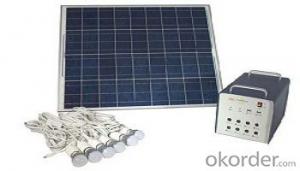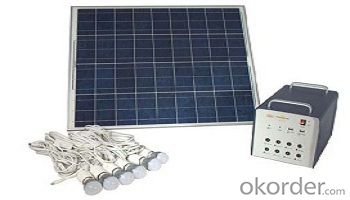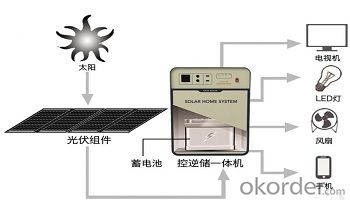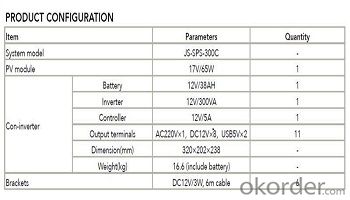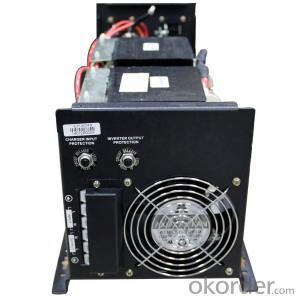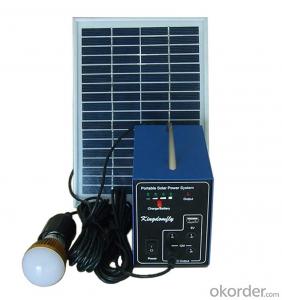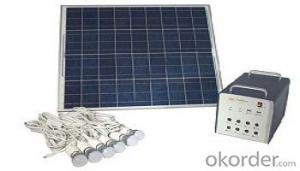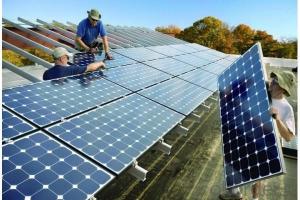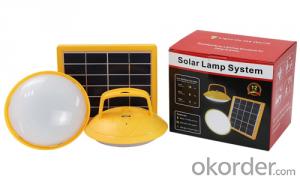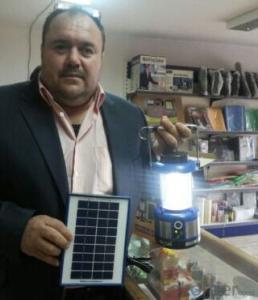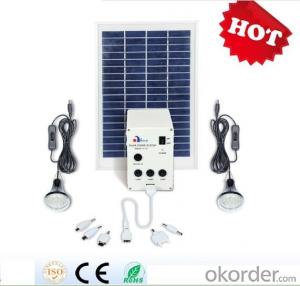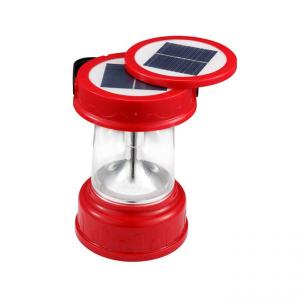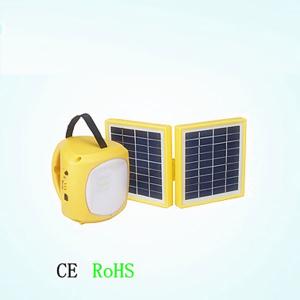Ongrid Solar Energy Systems - Sunpower Solar Module with LED Lighting and Mobile Phone Charger
- Loading Port:
- China main port
- Payment Terms:
- TT OR LC
- Min Order Qty:
- 10 watt
- Supply Capability:
- 100000 watt/month
OKorder Service Pledge
OKorder Financial Service
You Might Also Like
Product Description:
Name: SPS-300C sunpower solar module
Solar power system provides alternating current and direct current, which is produced by the modules transforming solar power into power, to home lighting, household appliance and other DC appliance, such as cell phone and laptop.
Solar power system is widely used in area lack of power, for example house power supplying, monitoring, communication base, fire prevention in forest area, pasture and meadow, aquaculture etc.
Solar DC Lighting System
Multiple protection system, safe and reliable performance.
Integrated and portable design, easy operation.
DC5V, DC12V, AC220V output, wide range application.
Clean engergy, cycle use.
Packaging & Delivery:
Packaging Detail: Quantity of carton :3pcs Color Box size: 28.5*11.5*12187.5px , 2.66kg/pc Carton size: 36.5*31*14375px G.W/N.W: 8.7/8.0 kg
Delivery Detail: 25 working days according to order quantity
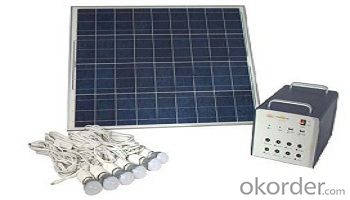
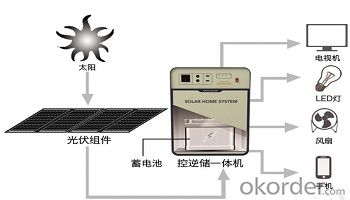
Advantages:
1.Solar Energy&green energy.
2. Easy to install, operate and maintain.
3. Ideal lighting products where normal electric is not convenient.
Packing details:
Quantity of carton :3pcs
Color Box size: 28.5*11.5*12187.5px ,
2.66kg/pc
Carton size: 36.5*31*575cm
G.W/N.W: 8.7/8.0 kg
Our services:
1. Sample: Sample is available. Please send us email about your detail consignee information: name, address, zip code and tel. Then we will contact you and send samples to you.
2. Small order: We can accept small order for this product. Please let us know your order quantity.
3. Customize: We accept OEM service and can customize products as customers' design.
4. After-sales service: We will give customers active feedback within 24hours after receive any of customers' questions
- Q: Can solar energy systems be used in areas with limited access to solar fuses and breakers?
- Yes, solar energy systems can still be used in areas with limited access to solar fuses and breakers. While fuses and breakers are important components for safety and protection in a solar energy system, there are alternative methods available to ensure the system operates safely. These can include using surge protectors, isolators, and other protective devices to prevent overloads and short circuits. Additionally, proper installation, regular maintenance, and adherence to safety guidelines can help mitigate risks even in areas with limited access to solar fuses and breakers.
- Q: Can solar energy systems be installed on military bases or installations?
- Yes, solar energy systems can be installed on military bases or installations. In fact, many military bases have already embraced solar energy as a sustainable and cost-effective solution. These systems not only help reduce dependence on fossil fuels but also enhance energy security and resilience for military operations. Furthermore, solar installations on military bases contribute to the overall goal of transitioning towards renewable energy sources and reducing carbon emissions.
- Q: Can a solar energy system be installed on a gas station or convenience store?
- A gas station or convenience store can indeed have a solar energy system installed. In fact, many of these establishments have already taken this step to lower their energy expenses and support sustainability. The solar panels can be placed on the roofs of these buildings or in nearby open areas. By doing so, these systems can produce electricity to power the store's lighting, refrigeration systems, and other electrical devices. Furthermore, any excess electricity generated by the solar panels can be redirected into the grid. This allows the gas station or convenience store to earn credits or income through net metering or feed-in tariff initiatives. By installing a solar energy system, these businesses not only reduce their energy bills, but also demonstrate their dedication to renewable energy and minimize their carbon emissions.
- Q: Can solar energy systems be used for powering off-grid eco-schools?
- Yes, solar energy systems can indeed be used for powering off-grid eco-schools. Solar panels can be installed on the rooftops or in open spaces surrounding the school to harness sunlight and convert it into electricity. This renewable energy source can power various electrical needs within the school, such as lighting, heating, cooling, and running appliances. By utilizing solar energy, off-grid eco-schools can reduce their dependence on fossil fuels and contribute to a more sustainable and environmentally friendly educational environment.
- Q: What is the role of solar energy systems in reducing greenhouse gas emissions?
- Solar energy systems play a crucial role in reducing greenhouse gas emissions by providing clean, renewable energy without emitting any harmful pollutants. By harnessing the power of the sun, these systems generate electricity, heat, and hot water, reducing the reliance on fossil fuels and traditional energy sources that contribute to greenhouse gas emissions. The use of solar energy helps to decrease the carbon footprint and combat climate change while promoting a sustainable and environmentally friendly energy transition.
- Q: How do solar energy systems affect the insurance premiums of a property?
- Solar energy systems can have a positive impact on insurance premiums for a property. By installing solar panels, the property becomes more environmentally friendly and less dependent on traditional energy sources, reducing the risk of damage or loss associated with power outages or utility failures. This can lead to lower insurance premiums as insurers recognize the decreased risk. Additionally, some insurance companies offer specialized policies or discounts specifically for properties with solar energy systems, further reducing premiums.
- Q: How much space is required to install a solar energy system?
- The amount of space required to install a solar energy system depends on various factors, such as the system's capacity and the available sunlight. On average, a small-scale residential solar system typically requires around 100-400 square feet of space. However, larger commercial or utility-scale systems might need several acres of land. Additionally, the installation can also be done on rooftops, utilizing available space without requiring additional land.
- Q: Can solar energy systems be used in areas with high snowfall?
- Yes, solar energy systems can be used in areas with high snowfall. While snow can temporarily reduce the efficiency of solar panels, it does not completely hinder their functionality. Additionally, the panels are typically installed at an angle that allows snow to slide off, and advancements in technology have made them more resistant to snow accumulation. Regular maintenance, such as clearing snow off the panels, can ensure optimal performance in snowy conditions.
- Q: Can solar energy systems be used in powering water pumps?
- Yes, solar energy systems can be used to power water pumps. In fact, solar-powered water pumps are becoming increasingly popular and widely used. Solar energy systems consist of solar panels that convert sunlight into electricity, which can then be used to power various appliances and devices, including water pumps. These pumps can be used for various purposes, such as irrigation, livestock watering, and even for residential or commercial water supply systems. There are different types of solar-powered water pumps available, including submersible pumps, surface pumps, and floating pumps, allowing for flexibility in meeting diverse water pumping needs. The use of solar energy for powering water pumps is not only environmentally friendly, as it reduces reliance on fossil fuels, but it also provides a cost-effective and sustainable solution, especially in remote areas where access to electricity may be limited.
- Q: What is the impact of tree shading on solar energy system performance?
- The impact of tree shading on solar energy system performance is significant. Trees can block sunlight from reaching the solar panels, reducing their efficiency and overall energy production. Shading can cause uneven distribution of sunlight, leading to hotspots and potential damage to the panels. Additionally, tree debris such as leaves and branches can accumulate on the panels, further obstructing sunlight and requiring regular cleaning. Proper tree management and placement of solar panels are crucial to maximize the performance and output of solar energy systems.
Send your message to us
Ongrid Solar Energy Systems - Sunpower Solar Module with LED Lighting and Mobile Phone Charger
- Loading Port:
- China main port
- Payment Terms:
- TT OR LC
- Min Order Qty:
- 10 watt
- Supply Capability:
- 100000 watt/month
OKorder Service Pledge
OKorder Financial Service
Similar products
Hot products
Hot Searches
Related keywords
